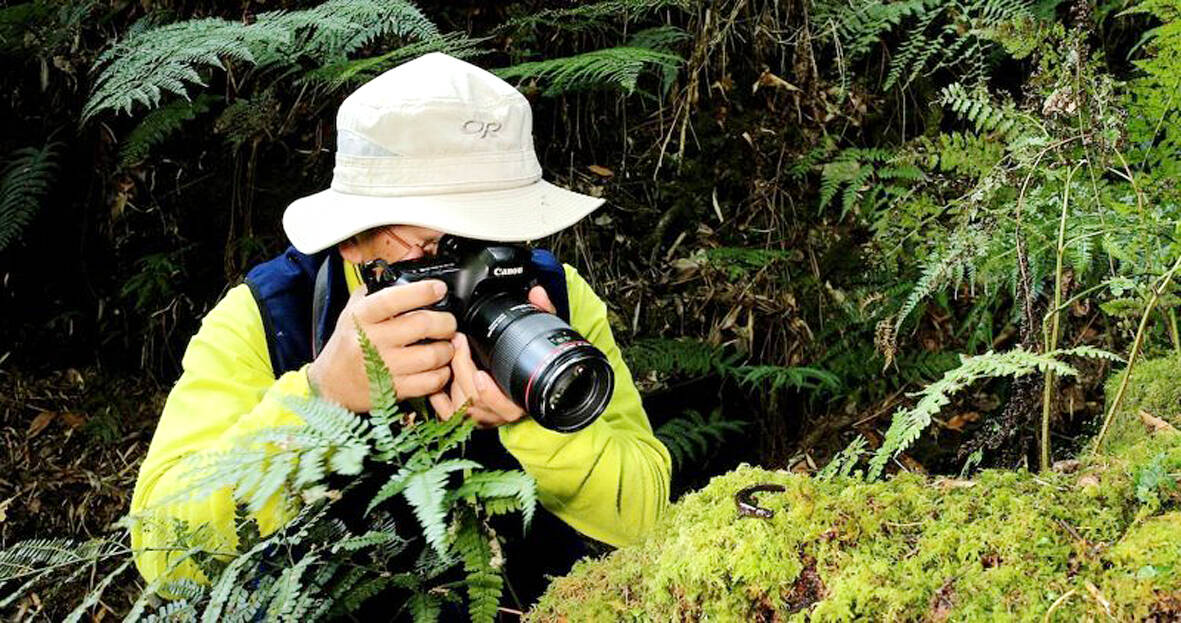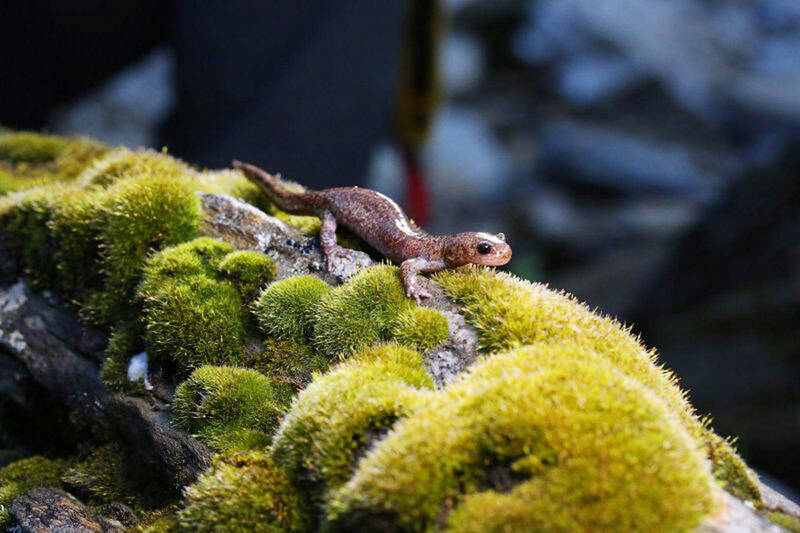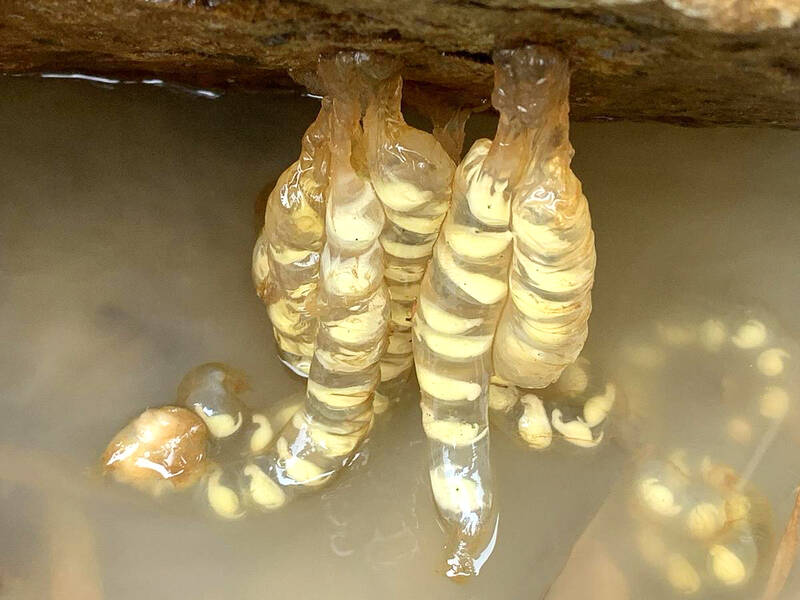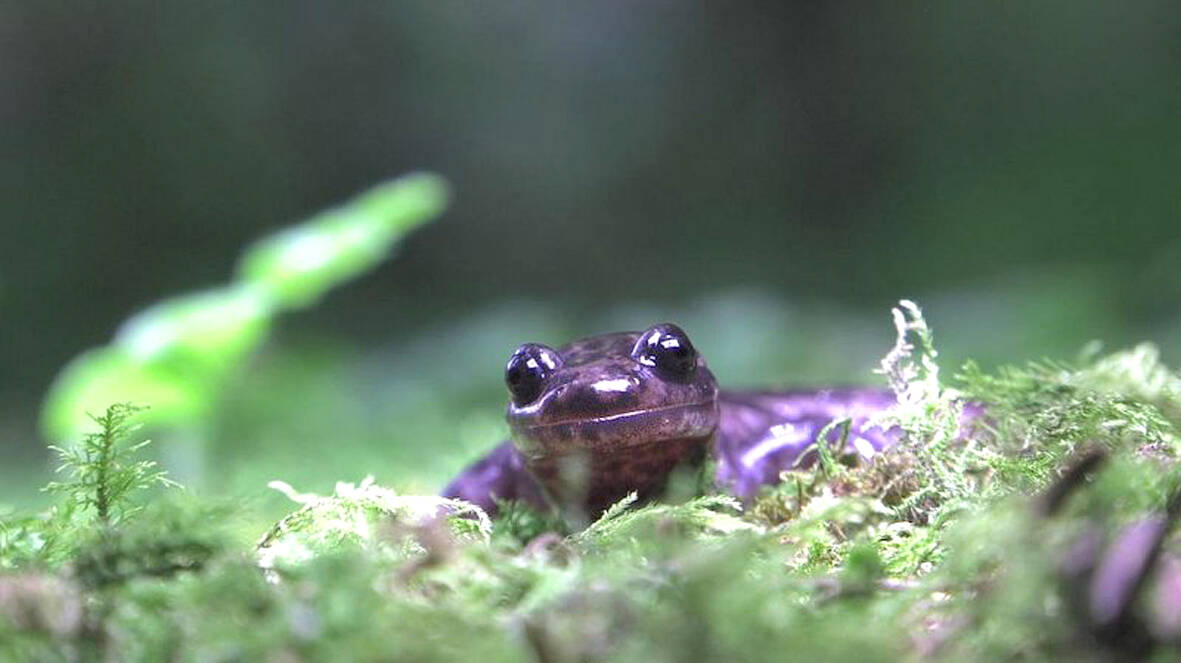There’s nothing glamorous about the tedious and often dangerous work of wildlife scientists, especially those who have to regularly trudge up 3,000m high peaks to observe Taiwan’s endangered hynobius salamanders. Remnants from the Ice Age, the five endemic species live in different mountains and habitats, making the task even more arduous.
For every amazing discovery, they endure countless empty-handed expeditions, and even though the oddly titled documentary Good Morni MIT (山椒魚來了) mostly focuses on their successes, the storyline also gets a bit repetitive and drawn out at points.
It doesn’t matter, however, as the rare, close-up footage of the ridiculously charming salamanders slowly crawling through the terrain with their little limbs and catching bugs with their sticky tongues are simply captivating. Obviously it took years of painstaking camera work to follow these researchers around to capture these perfectly-timed moments, and we even get to see all the details of the salamanders’ life cycle, from egg to maturity. It requires returning to the same spot every week for several months to capture this whole process, and the scenery of the surrounding habitat is also breathtaking.

Photo courtesy of Barley Productions
Director Arthur Mai (麥覺明) is definitely well-suited for the job, having conquered some of the world’s highest peaks and once attempted to scale Everest. In addition to his feature films on fireflies and Formosan black bears, he’s best known for producing the long-running nature program Made in Taiwan (MIT台灣誌) for the past two decades. The movie’s special effects and design elements do have more of a television show feel to them, and the English translations are wonky (Siberia is spelled Cyberia, for instance), but the wildlife and landscape camerawork is absolutely top notch.
The film is also an ode to the intrepid researchers, in particular National Taiwan Normal University’s Lai Chun-hsiang (賴俊祥), who lost his life during an 2016 expedition to Qilai North Peak (奇萊北峰). Mai was with them on that expedition, and the footage is harrowing and heartbreaking.
The audience also gets an in-depth look at the work the scientists do as they capture, tag and take samples of the creatures, and learn about the many challenges they face. There are a few memorable characters that provide comedic moments, including hynobius research pioneer Lue Kuang-yang (呂光洋), who in his late 60s still can’t stop himself from overturning every stone to see if there’s a salamander underneath. The unassuming Lue is a giant in the field, having identified numerous endemic reptiles and amphibians since the 1970s. There’s even a lizard named after him.

Photo courtesy of Barley Productions
Quite a few people are featured throughout the film, and fortunately Mai has done the audience the favor of showing their name and position every time they come on screen. However, many end up saying the same thing, and the film could have been edited to avoid this repetition.
Ultimately, Mai hopes to attract more public attention to these cold-loving critters whose habitat is shrinking due to global warming and human development. Like his previous (also oddly titled) feature Formosa BB is Coming (黑熊來了), which was narrated by Cheer Chen (陳綺貞), he’s able to again enlist the star power of Taiwan’s most iconic singer-songwriters.
This time, rock legend Wubai (伍佰) provides the narration with his instantly recognizable voice, and Mai’s old pal, the folk crooner Bobby Chen (陳昇), returns to pen the theme song. Mai says in an interview that like the salamanders, the musicians are also rare breeds unique to Taiwan. It’s a bit strange at first to hear Wubai channeling the spirit of such a tiny, cute amphibians, but he sounds wholesome and heartfelt.

Photo courtesy of Barley Productions
Anyone who likes animals or cares about conservation will surely enjoy this film. And sometimes the public might feel that these researchers are blessed to be able to spend most of their time in beautiful nature looking at interesting creatures, but it’s really much more than that.

Photo courtesy of Barley Productions

From the last quarter of 2001, research shows that real housing prices nearly tripled (before a 2012 law to enforce housing price registration, researchers tracked a few large real estate firms to estimate housing price behavior). Incomes have not kept pace, though this has not yet led to defaults. Instead, an increasing chunk of household income goes to mortgage payments. This suggests that even if incomes grow, the mortgage squeeze will still make voters feel like their paychecks won’t stretch to cover expenses. The housing price rises in the last two decades are now driving higher rents. The rental market

July 21 to July 27 If the “Taiwan Independence Association” (TIA) incident had happened four years earlier, it probably wouldn’t have caused much of an uproar. But the arrest of four young suspected independence activists in the early hours of May 9, 1991, sparked outrage, with many denouncing it as a return to the White Terror — a time when anyone could be detained for suspected seditious activity. Not only had martial law been lifted in 1987, just days earlier on May 1, the government had abolished the Temporary Provisions Effective During the Period of National Mobilization for Suppression of the Communist

Fifty-five years ago, a .25-caliber Beretta fired in the revolving door of New York’s Plaza Hotel set Taiwan on an unexpected path to democracy. As Chinese military incursions intensify today, a new documentary, When the Spring Rain Falls (春雨424), revisits that 1970 assassination attempt on then-vice premier Chiang Ching-kuo (蔣經國). Director Sylvia Feng (馮賢賢) raises the question Taiwan faces under existential threat: “How do we safeguard our fragile democracy and precious freedom?” ASSASSINATION After its retreat to Taiwan in 1949, the Chinese Nationalist Party (KMT) regime under Chiang Kai-shek (蔣介石) imposed a ruthless military rule, crushing democratic aspirations and kidnapping dissidents from

Fundamentally, this Saturday’s recall vote on 24 Chinese Nationalist Party (KMT) lawmakers is a democratic battle of wills between hardcore supporters of Taiwan sovereignty and the KMT incumbents’ core supporters. The recall campaigners have a key asset: clarity of purpose. Stripped to the core, their mission is to defend Taiwan’s sovereignty and democracy from the Chinese Communist Party (CCP). They understand a basic truth, the CCP is — in their own words — at war with Taiwan and Western democracies. Their “unrestricted warfare” campaign to undermine and destroy Taiwan from within is explicit, while simultaneously conducting rehearsals almost daily for invasion,